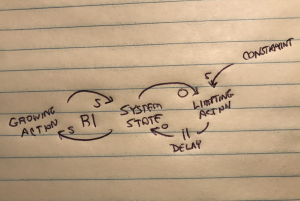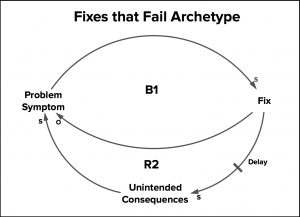Before returning to examine search, inquiry, and observation as means of acquiring or creating information, it is probably best to explore the question of what exactly is the right information. In fact, is it even accurate to say that our goal is “information” in the end?
There is an old adage that goes something like this:
” An ounce of information is worth a pound of data; an ounce of knowledge is worth a pound of information; an ounce of understanding is worth a pound of knowledge; and an ounce of wisdom is worth a pound of understanding.”
With that adage in mind, information alone appears to miss the mark as a goal. So, the right information is only going to help the learning organization if that information can be transformed into knowledge, understanding, and ultimately wisdom in action. I know, this sounds rather trite, but oh so true and so very important for anyone leading an organization to embrace.
Here is a quick example that might draw you into this discussion. My assistant was having trouble with her PC and this was causing great delays in some work she was doing. She called the help desk and a technician came up to her office and said he needed to take her computer. On the way by, I asked him what he thought the problem was. He said, “I don’t really know. I will go downstairs and search the Microsoft database for this error or use a search engine and see if I can find this error.” I followed up by asking again, “Well, based on what you know about computers, what do you believe it could be?” I was frustrated because with my IT background, I had a pretty good idea that the problem was with her memory chip (not enough, not working/damaged). The point was, he just did not have the “knowledge” (as you will see below) to diagnose the problem and was going to rely on what I call “transient knowledge” — meaning, just look something up to see if someone else solved the problem, use that fix, see if that works, then forget about it — to correct the problem.
It was indeed a simple problem of replacing a memory card, but he had no idea why in the end. There was data, and even information available to him, but he lacked true knowledge (had not experienced this before) to diagnose and solve the issue. More importantly .. in fact, MOST importantly, he lacked understanding and certainly any wisdom in terms of creating a new solution making use of data, information, and any knowledge he did have. He basically, did not have enough information and knowledge, or lacked a grasp of the relationships of that information and knowledge, to learn.
The Progression from Data to Wisdom
Let’s take a quick look at the progression from data to wisdom. Russell L. Ackoff, an American organizational theorist, consultant, and Anheuser-Busch Professor Emeritus of Management Science at the Wharton School, University of Pennsylvania, made great contributions in the area or learning and learning systems, and the following descriptions are based on his work.
Raw data is a collection of symbols (letters, words, numbers, etc.) that represent certain activities.
Information answers questions about data such as who, what, when, where, and how many. We calculate data to arrive at information. We sort and correlate data into information. We, in essence, ask questions of data through our IT department or in a spreadsheet, or on paper, and arrange that data into what we call information.
Knowledge starts to include that “how to” type of information. Knowledge offers instruction based up on information and can only be based on experience or from learning the “how to” from someone else who has the experience. So knowledge is understanding the “how to” based on personal or second-hand experience.
Understanding is developed as one examine questions relating to “why”. Why do things work that way? Why does that matter? Why is that information or knowledge relevant to this situation? Why would that be advantageous in the future? Why would that fail? Understanding is required in situations where it is significant to determine the relevance of data, information, and knowledge, when one must fully recognize why the situation exist in a certain state, when one must determine why and how a specific situation relates causally to objectives or a desired future state.
Wisdom is the essential ability to perceive and evaluate the long-term consequences of actions, behaviors, plans and perhaps most importantly, to clearly recognize the “right” thing to do. Peter Drucker frequently made the distinction between doing things right and doing the right thing. Wisdom should also prevail when considering the statement, “Just because we can, doesn’t mean we should.” Actions are the result of data, information, knowledge, and understanding. Wisdom examine the value of actions – value to stakeholders (which includes investors, employees, the environment, the economy, leadership, customers, suppliers, etc.).
Summary
What is the RIGHT information? You certainly want to start with data and the information it provides when asking a few simply questions. However, the RIGHT information you should always be striving towards is how to convert data, information, and knowledge into deeper understanding and hopefully – wisdom born not just from intuition, but from learning.

